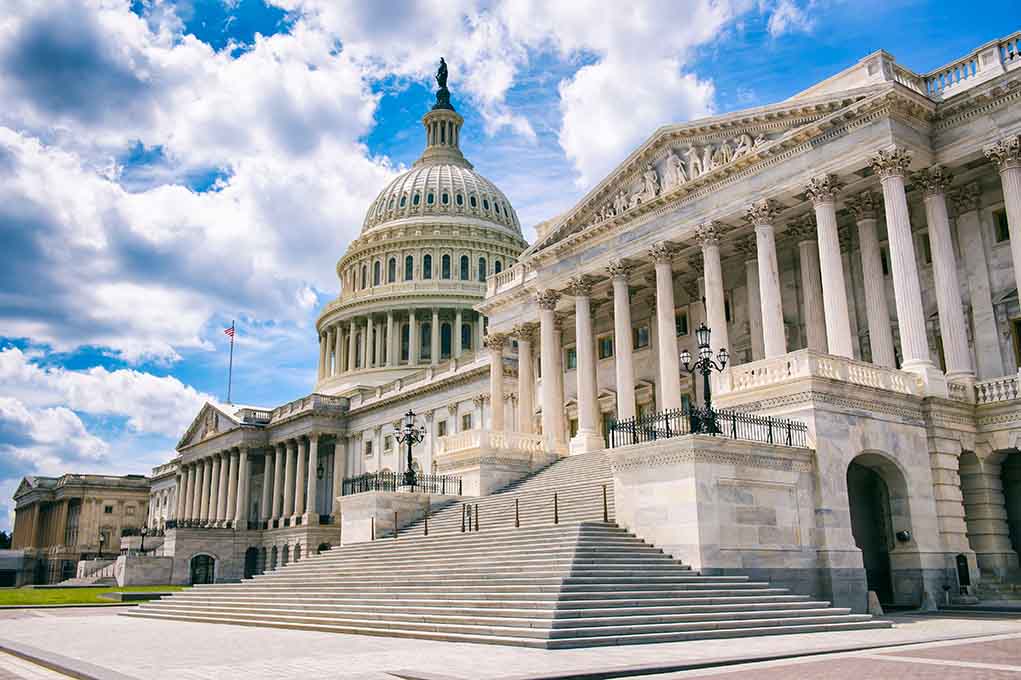
In a turbulent political landscape, GOP divisions could derail President Trump’s ambitious reconciliation package, leaving many wondering if they can meet the Memorial Day deadline.
Key Takeaways
- President Trump’s agenda is facing a major test in Congress, particularly regarding funding tax cuts.
- Significant cuts to Medicaid are proposed by some Republicans to help fund these tax cuts.
- Congress returns for a four-week session to address a sweeping bill supporting President Trump’s agenda.
- Republicans face intraparty divisions and must navigate budget rules to pass the bill through the House and Senate.
GOP’s Intraparty Conflict
The GOP House faces significant divisions as they strive to move President Trump’s reconciliation package forward. A central issue is the proposed Medicaid reductions and the cap on the state and local tax deduction. Some party members argue that reforms are essential to funding Trump’s tax cuts, while others believe cuts would harm vulnerable communities. Speaker Mike Johnson’s recent efforts to mediate these differences highlight the challenges within the party’s ranks as the Memorial Day deadline looms.
Congressman Chip Roy stands firm on the need for budget reform, advocating that Medicaid shouldn’t offer more than Medicare and that eligibility must be streamlined. The Congressional Budget Office’s analysis warns that proposed Medicaid cuts would result in millions losing insurance, yet savings estimated at $700 billion could bolster Trump’s tax agenda. Despite the opposition, Republicans like Roy push for a model minimizing federal control, encouraging direct doctor-patient interactions.
🎤 Chairwoman @RepLisaMcClain: “House Republicans continue to work to codify President Trump and the American people’s agenda.”
This week, we will pass @RepMTG’s bill to rename the Gulf of AMERICA. pic.twitter.com/xp0ADUjGTn
— House Republicans (@HouseGOP) May 6, 2025
Beyond Medicaid: A Broader Legislative Brawl
Power dynamics within the GOP also influence the reconciliation package, with some moderates opposing Medicaid cuts altogether. Speaker Johnson appears to have removed these drastic cuts from the table, pointing to the need for unity on Trump’s “big, beautiful bill.” Meanwhile, regional disagreements have surfaced over the federal funding structure, tax deductions, and the potential rollback of clean energy investments to align with Trump’s reduction goals.
“Yes, well, we’re only going to be able to support legislation that will reduce the deficit. Otherwise, we will be a no,” stated Rep. Chip Roy.
This ongoing debate signals a critical moment for the GOP’s legislative strategy. While many Republicans desire an uncluttered focus on a robust tax agenda, pushing Trump’s priorities could be hindered by internal disputes over Medicaid and other spending components. As deadline negotiations intensify, both sides within the party aim to find common ground without sacrificing their foundational principles on spending and tax reform.
Future Projections
Prospective resolutions may involve trade-offs on state responsibility in Medicaid reforms and potential extensions of Trump’s 2017 tax cuts. Committee meetings over the coming weeks will shape the final package, as party members balance policy ambitions with political realities. Although there’s an anticipation of achieving significant components of Trump’s agenda, ongoing fiscal disputes remind policymakers of the challenge of aligning diverse interests within the GOP.
Balancing fiscal responsibility with political expediency remains a task as complex as the government’s financial dilemmas themselves. Yet, the GOP continues to press forward, aspiring to present a coherent plan by the Memorial Day deadline, to cement President Trump’s legislative legacy.
Sources:
- Rep. Chip Roy says GOP leaders need to ‘show us the math’ in tax cut, Medicaid talks | PBS News
- Republicans fall further apart on Trump’s ‘big, beautiful bill’

